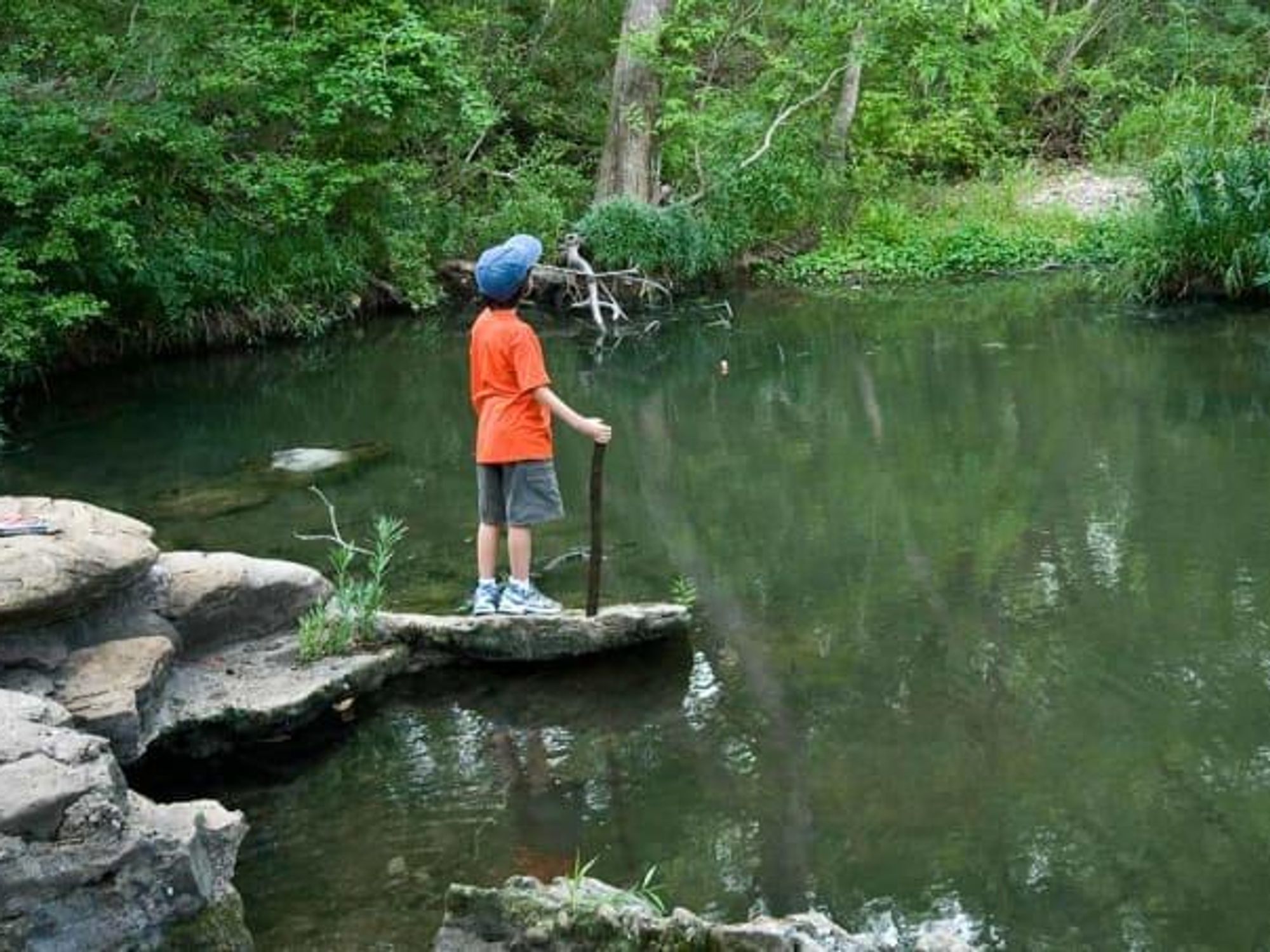Caching In
Find hidden treasures in a Texas state park on a geocaching adventure

A hike through the Lockhart State Park offers plenty of natural discoveries, and some not-so-natural ones too, if you know where to look. Geocaching, a worldwide treasure hunting system (usually for tiny objects like toys and crystals), gives families, friends, and solo explorers some incentive to walk off the beaten path — and connect with nature in the process. There are more than 3 million geocaches to be discovered around the world.
The system is easy for an adult to learn on a smartphone, and most people can probably find treasures close to their home. For those looking for another layer of learning — teaching kids about nature, perhaps, or how to use GPS navigation that isn’t generated by Google Maps — the state park is hosting a getting-started workshop on Saturday, September 11.
Attendees new to geocaching will hear some background about the sport from geocacher and customer service representative for the park, Juliette Garza, as well as learn how to use the GPS and hunt down example caches. They’re designed to be fun, but easy to find, so both kids and adults can get the hang of it before venturing out on their own. They can use their new skills before even leaving the park; there are three permanent geocaches there.
“It’s just another thing to do,” says Garza, explaining why the park gets involved. “It’s just a really fun and healthy activity to do outside: walking around, searching for something that you didn’t know was there.”
Geocaching on a trip provides fun anchor points in a hike visitors are unfamiliar with, or gives new dimension to a trail they’ve seen countless times near home. A cache’s name usually provides a clue, or something that will make sense when it’s found. (Some of the caches hidden by park interpreter Lauren Hartwick create a pun about what someone might do in the area, or point out a safety tip.)
Many caches are designed to teach something, whether it’s simply leading the geocacher to an interesting landmark or highlighting a historical or scientific theme. Multicaches can bring people on tours from one location to another. In the text accompanying some caches, the creator may enter a puzzle to solve or give information about the surrounding area, like which influential person was born nearby, or what kind of rock the cache is hidden behind.
Creating a themed geocache can be a fun way to put school learning into practice. Kids can leave postcards about their hometown for other geocachers to learn from, or they can help create riddles using facts they’ve learned. Garza is interested in the practical knowledge that comes from being in nature and thinking critically. Just the act of being outside in a park or forest offers experiences most kids may not get from sitting in a classroom.
“With geocaching, you always have to be prepared,” Garza says. “Whenever you go out, no matter the weather, you need to dress appropriately. If you know it’s going to be a rainy day, you can always pack a little jacket. If it’s a sunny day, then you definitely want water, sunglasses, sunscreen.”
Learning to take agency for oneself in a park is not just about comfort. Sometimes the GPS appears to lead off a trail, and hikers are expected to use common sense to stick to safety and avoid disturbing off-trail areas as much as possible. Some caches don’t have anything to take and simply ask that geocachers add their name to the log and leave the area undisturbed. One of Garza’s tips is to leave everything exactly where it’s found, so there is not a game of geographical telephone, in which each geocacher moves the item by a few inches until it can’t be found from the coordinates.
“Have you heard of Leave No Trace?” Garza asks of the explorer’s code that encourages hikers to minimize their impact on the land around them. “A lot of those rules apply to geocaching. Whenever you pack in, you’re definitely going to want to pack it out, too, so you don’t leave any clues, you don’t hurt nature, stuff like that.”
The upcoming workshop is the park’s first in geocaching, and Garza hopes to reprise her role as the geocaching teacher for more in the future. The park usually holds recurring “park interpreting” workshops once a month on the weekends. Geocaching joins other workshops like stargazing, watercolor painting, and identifying butterflies and native plants. All the events are free, and some require registration. See more on the state park’s calendar at tpwd.texas.gov.

 The exterior of the cabins really drives home the old-school style.Photo courtesy of Taylor Bennett & Hunter Mitchell
The exterior of the cabins really drives home the old-school style.Photo courtesy of Taylor Bennett & Hunter Mitchell This cabin refresh focuses on simple joy and livability.Photo courtesy of Taylor Bennett & Hunter Mitchell
This cabin refresh focuses on simple joy and livability.Photo courtesy of Taylor Bennett & Hunter Mitchell Guests can cook in their rooms or enjoy a poolside snack.Photo courtesy of Taylor Bennett & Hunter Mitchell
Guests can cook in their rooms or enjoy a poolside snack.Photo courtesy of Taylor Bennett & Hunter Mitchell

